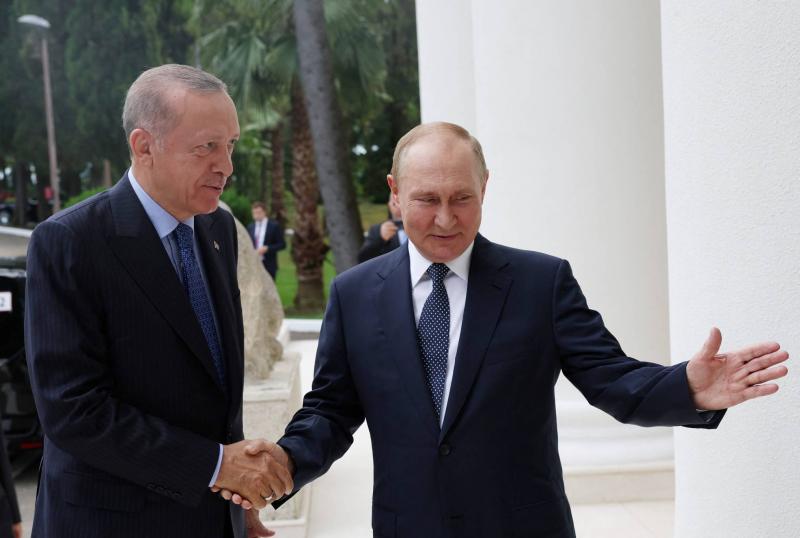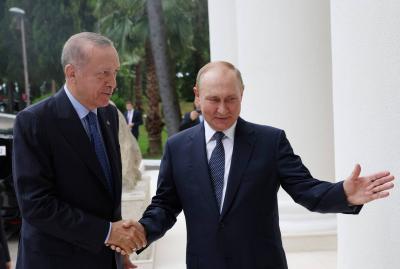After distancing Turkey from its Western allies, President Recep Tayyip Erdoğan has shifted course with steps that pleased the United States but angered Russia. Analysts view this change as partially aimed at addressing the economic slowdown in his country and boosting foreign investment. The reassessment of foreign policy is part of a broader evaluation being conducted by Erdoğan after six weeks of being re-elected for another presidential term. Erdoğan has also altered the economic track by abandoning the unconventional monetary policies he previously adopted, which are responsible for Turkey's rampant inflation and currency collapse.
Erdoğan's relationship with Russian President Vladimir Putin has for years influenced Turkey's relations with its traditional Western allies, alongside other factors, including concerns over his authoritarian rule. However, Erdoğan's recent approval of Sweden's accession to NATO, a step he resisted for months, was welcomed by Western leaders seeking to bolster the alliance after Russia's invasion of Ukraine.
Erdoğan's moves demonstrate a "clear rebalancing" of relations, contrasting with Moscow's reaction last week when Ankara handed over five Ukrainian leaders who had been held in Turkey under the terms of a prisoner exchange agreement to President Volodymyr Zelensky. Moscow condemned that step as a violation of the agreement mediated by Turkey, stating that Ankara had promised to keep the leaders in Turkey and complained of not being informed.
Analysts believe Erdoğan's actions, including his announcement of support for Ukraine's NATO membership, are not coincidental. Sirin Galip from the British research center Chatham House noted, "There has been a perception in recent years that Turkish-Russian relations have gone too far, but these (moves by Erdoğan) indicate a clear rebalancing." He added that a key motivation is Turkey's attempt to pull out of its economic stagnation and stimulate foreign investment, indicating that strained relations with the West had weakened the economy and investment inflows.
Turkey has begun to attract Gulf Arab investments, but more is needed. He noted, "Turkey does not want its relations with Russia to suffer, but this will inevitably impact those relations. Erdoğan feels he has more room to maneuver after the elections."
After giving the green light to Sweden's NATO membership just a day earlier, Washington announced that it would proceed with sending F-16 fighter jets to Turkey in consultation with Congress. Turkey had expressed interest in purchasing the fighters and equipment to upgrade its current fleet as early as October 2021. Both Turkish officials and the Biden administration have denied suggestions that Ankara's approval of Sweden's NATO membership is tied to the sale of F-16s.
A senior Turkish official stated that improving relations with the West will not harm Turkey's ties with Russia, adding that engaging with the West is crucial to supporting Turkey in its financial needs. Erdoğan's ties with Putin have significantly influenced diplomacy surrounding the war in Ukraine, enabling him to mediate a safe grain export agreement from Ukrainian ports on the Black Sea, which is set to expire on July 17. Moscow has threatened to withdraw from it due to what it views as the West's failure to fulfill promises to remove obstacles to Russian grain and fertilizer exports.
Kremlin spokesman Dmitry Peskov stated that there are currently no plans for Putin to meet Erdoğan to discuss extending the agreement and it is still unclear when Putin might visit Turkey. Ankara is important for Moscow as Erdoğan refuses to join Western sanctions against Russia due to the invasion of Ukraine, while air travel and trade ties between the two countries continue, with Turkey being a rare buyer of Russian gas.
Moscow is also significant for Ankara as a trading partner and a key source of tourism revenues, and it is building Turkey's first nuclear power plant. Ahead of the hotly contested Turkish presidential elections in May, Moscow allowed Ankara to defer as much as $4 billion of its gas import bill for the first time this year, easing pressure on dwindling currency reserves.
The Kremlin stated it intends to develop relations with Turkey "despite all disagreements." Peskov remarked, "Turkey can turn to the West; we know that in the history of the Republic of Turkey, there have been periods of intense orientation toward the West, and there have been less intense periods." He added, "But we also know that... no one wants to see Turkey in Europe, I mean the Europeans. Turkish partners should not wear rose-tinted glasses." Turkey's bid to join the European Union has been stalled for years since talks opened in 2005. In 2009, Cyprus blocked six out of 35 chapters Turkey must complete as part of the accession negotiations.
Analysts note that in addition to visa-free travel for Turks, Erdoğan seeks closer trade arrangements with the bloc, even if membership remains elusive due to issues related to democratic progress and other matters. There has not been much enthusiasm among European governments to revive the process. Evrin Baltacı, a professor of international relations at Ozyegin University in Istanbul, stated, "Turkey wants the EU to play a role in economic recovery. 'Let’s revitalize relations between Turkey and the EU' is an indirect way of saying this."




